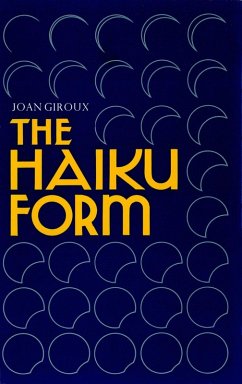This classic book is a collection and analysis of Japanese haiku in the English language.
The Haiku is a brief poetic form expressing a moment of insight. No foreign form since the sonnet has so fascinated and challenged the poets of the English-speaking world. Yet no scholar or critic, until now, has undertaken a definitive study of the problems of writing haiku in English.
This book, the first of its kind, examines English language haiku in the light of Japanese form. Author Joan Giroux explicates the meaning and history of the Japanese haiku, its cultural background the creative process which gives it birth and the technical devices developed by Japanese poets over the centuries. Examples by classic and contemporary poets, including Basho and Buson, Shiki and Hastutaro, are given Romanized Japanese and in English translation. Poems, in English, from early efforts by Ezra Pound and Wallace Stevens to work of contemporaries like James Hackett, are discussed and evaluated. Wherever possible, comparisons are made, contrast indicated and suggestions given, with a rare sensitivity to the poetic possibilities of both languages and keen appreciation of the unique qualities of both cultures.
The Haiku is a brief poetic form expressing a moment of insight. No foreign form since the sonnet has so fascinated and challenged the poets of the English-speaking world. Yet no scholar or critic, until now, has undertaken a definitive study of the problems of writing haiku in English.
This book, the first of its kind, examines English language haiku in the light of Japanese form. Author Joan Giroux explicates the meaning and history of the Japanese haiku, its cultural background the creative process which gives it birth and the technical devices developed by Japanese poets over the centuries. Examples by classic and contemporary poets, including Basho and Buson, Shiki and Hastutaro, are given Romanized Japanese and in English translation. Poems, in English, from early efforts by Ezra Pound and Wallace Stevens to work of contemporaries like James Hackett, are discussed and evaluated. Wherever possible, comparisons are made, contrast indicated and suggestions given, with a rare sensitivity to the poetic possibilities of both languages and keen appreciation of the unique qualities of both cultures.
Dieser Download kann aus rechtlichen Gründen nur mit Rechnungsadresse in A, D ausgeliefert werden.


